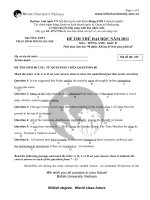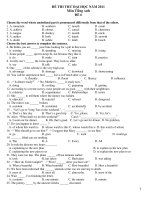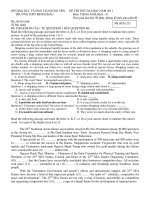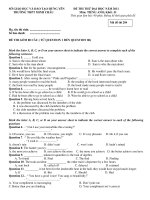ĐỀ LUYỆN THI THỬ ĐẠI HỌC NĂM 2011 MÔN : TIẾNG ANH – ĐỀ SỐ 7 pot
Bạn đang xem bản rút gọn của tài liệu. Xem và tải ngay bản đầy đủ của tài liệu tại đây (130.58 KB, 3 trang )
ĐỀ SỐ 7
ĐỀ LUYỆN THI THỬ ĐẠI HỌC NĂM 2011
MÔN : TIẾNG ANH – KHỐI D
Câu 1 : Ngữ âm (1 điểm)
Chọn từ có phần gạch dưới được phát âm khác với các từ còn lại. Chép từ đã chọn vào
giấy làm bài.
1. A. stopped B. ordered C. prepared D. defined
2. A. his B. books C. teachers D. workers
3. A. without B. within C. clothing D. strengthen
4. A. plough B. laugh C. caught D. rough
5. A. left-handed B. looked C. washed D. watched
Câu 2: Từ Vựng (2 điểm)
Chọn 5 trong số 7 từ trong khung và xác định dạng đúng của từ đã chọn để điền vào chỗ
trống trong các câu sau đây. Chép dạng đúng của từ đã chọn vào giấy làm bài. Không
cần chép lại cả câu.
Prefer – succeed – employ – judge – differ – appear - describe
1. Farmers can protect their land by growing ……………………… crops on the
same land.
2. Their ………………………… went on strike because they had to work ten hours
a day.
3. Did his team play ………………………… last night?
4. That witness could give a very detailed ………………………… of the bank
robber.
5. His accurate ………………………… on the matter surprised all of us.
Câu 3: Ngữ pháp (3 điểm)
1. Chọn một từ/nhóm từ thích hợp nhất trong ngoặc đơn để điền vào mỗi chỗ trống
trong các câu sau đây. Chép từ/nhóm đã chọn vào giấy làm bài. Không cần chép
lại cả câu. (1 điểm)
a. When ……………………… as food, the root of this plant should be soaked in
water overnight. (eat – ate – eating – eaten)
b. I’m used ……………………… to bed late now. ( to go – going – to going – to
be going)
c. If you had sold that car, you ………………………… in trouble with it now.
(Wouldn’t be – wouldn’t have to be – will be – won’t be)
d. It’s difficult …………………… high scores in this test. (get – to get –getting –
to be getting)
e. After ………………………… for five hours in the sun, they were exhausted.
(worked – being working – having worked – had worked)
2. Đổi các câu sau đây sang dạng bị động (passive voice). Chép các câu đã đổi sang
dạng bị động vào giấy làm bài. (1 điểm)
a. No one has ever opened that mysterious box.
b. Has he watered the flowers yet?
3. Đổi các câu sau đây sang câu trực tiếp (direct speech) Chép các câu đã đổi sang
câu trực tiếp vào giấy làm bài. (1 điểm)
Ví dụ :
They asked me where I had been. “Where have you been?”
a. I asked if I had been watching the latest TV serial.
b. He warned me not to drive too fast in the crowded streets.
Câu 4: Đọc hiểu (2 điểm)
Đọc đoạn văn sau đây và xác định các câu in nghiêng phía dưới là Đúng (true) hoặc
Sai (Fasle) so với nội dung của đoạn văn. Ghi True hoặc False sau số thứ tự tương
ứng của mỗi câu in nghiêng vào giấy làm bài.
The Secrets of a Very Long Life
There are several places in the world that are famous for people who live a very long
time. These places are usually in mountainous areas, far away from modern cities.
Hunza, in the Himalayas, is where many people over 100 years of age are still in good
physical health. Additionally, men of ninety and women of fifty still have babies.
Scientists think that these people have these benefits: a healthful unpolluted
environment with clean air and water; a simple diet high in vitamins, fiber, and
nutrition, but low in fat, cholesterol, sugar, and unnatural chemicals; and physical
work as well as other activities in the fields. The Caucasus Mountains in Russia are
also famous for the longevity of its inhabitants – mostly farmers. One reason for the
good health of the people might be regular exercise in the moderate climate: the
temperature is about 70 Fahrenheit all year long. In addition, the water from
mountain streams is high in minerals – a very valuable resource for people,
vegetables, fruits, and wildlife.
1. Men over 80 years old in Hunza can be new fathers.
2. People in Hunza consume a lot of vitamins, fiber, fat, sugar, nutrition, etc.
3. It’s very cold in winter and hot in summer in the Caucasus Mountains.
4. The water in the Caucasus Mountains contains a lot of minerals
Câu 5: Việt (2 điểm)
Dùng các từ/nhóm từ gợi ý sau đây để viết thành câu hoàn chỉnh.
1. We/ think about/ buy/ house/ the office//
2. The furniture/ expensive/ I/ not/ buy//
ĐÁP ÁN TRƯỜNG CAO ĐẲNG SƯ PHẠM THÀNH PHỐ HỒ CHÍ MINH – NĂM
2005
Câu 1: Ngữ âm (1 điểm – mỗi từ đúng 0,2 điểm)
1. stopped 2. books 3. strengthen 4. plough 5.
left-handed
Câu 2: Từ vựng (2 điểm – mỗi từ chọn đúng và viết đúng dạng 0,4 điểm)
1. different 2. empoyees 3. successfully 4. description 5.
judgement/ judgment
Câu 3: Ngữ pháp (3 điểm)
1. Chọn một từ/ nhóm từ thích hợp nhất trong ngoặc đơn để điền vào chỗ trống (1
điểm)
a. eaten b. to going c. wouldn’t be d. to get e. having
worked
2. Đổi các câu sau đây sang dạng bị động (passive voice) (1 điểm)
a. That mysterious box has not/ never been opened
b. Have the flowers been watered yet?
3. Đổi các câu sau đây sang câu trực tiếp (direct speech) (1 điểm)
a. “Have you been watching the lasted TV serial?”
b. “Don’t drive too fast in the crowed streets”
Câu 4: Đọc hiểu (2 điểm – mỗi đáp án đúng 0,5 điểm)
1. TRUE 2. FALSE 3. FALSE 4. TRUE
Câu 5: Viết (2 điểm – mỗi câu đúng 1 điểm)
1. We are thinking about buying near the office
2. The funiture is (was) very expensive, so I do not (did not) buy it
hoặc:
The funiture is (was) very expensive, therefore I do not (did not) buy it
hoặc:
The funiture is (was) so expensive that I do not (did not) buy it









